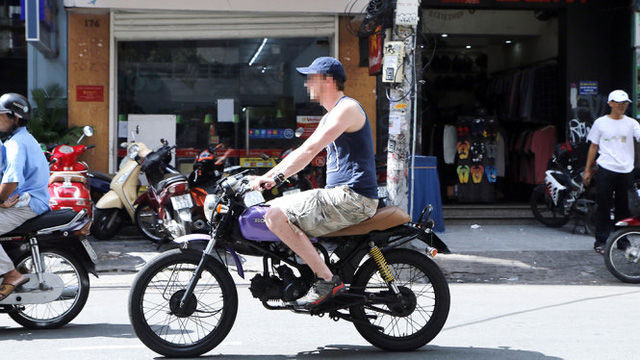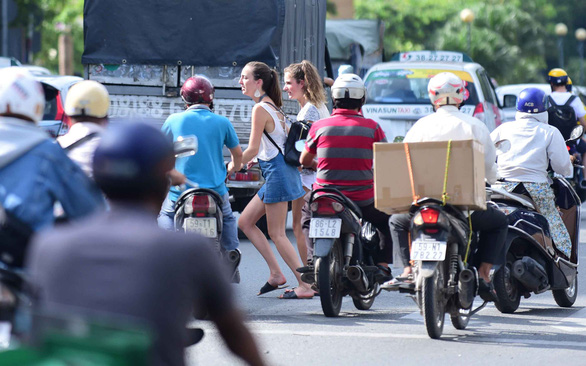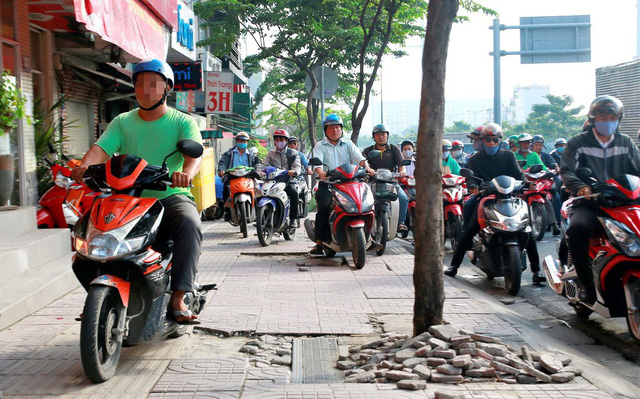An ongoing campaign to intensify crackdown on foreigners who violate traffic laws in Ho Chi Minh City and the lively discourse it has generated among local expats provoke many thoughts on the role of law in Vietnam.
Nationwide statistics estimate that around 500 traffic accidents in Vietnam each year, including fatal ones, involve foreigners. The administration of Ho Chi Minh City believes this number to be worrisome and could negatively affect the city’s image, as well as that of Vietnam, on a global scale.
With that belief in mind, the city has since August 1 launched a campaign to educate foreigners on traffic laws in Vietnam and to begin strictly handling foreign violators after the educational period ended on August 15. The campaign is expected to last until the end of October.
The news instantly grabbed the attention of the expat community in Ho Chi Minh City, many of whom believe they are being ‘discriminated’ against.
C.V., a member of the ‘Expats in Ho Chi Minh City (Saigon)’ group on Facebook, even suggests the city authority should educate its own people on traffic laws before thinking of educating foreigners.
In reality, it’s not uncommon for foreigners who live in Vietnam to swear by the famous, time-tested Western proverb: “When in Rome, do as the Romans do.”
But should this when-in-Rome attitude be encouraged?
 |
| A foreigner rides a motorbike without a helmet in Ho Chi Minh City. Photo: Ngoc Duong / Tuoi Tre |
B.A., an American who teaches English in Hanoi, when asked whether he has grown accustomed to traffic in Vietnam, told me he now considers riding on the sidewalk a normality after seeing many Vietnamese do the same without answering to the law.
Some travel agencies even offer tours for foreigners to experience traffic in Vietnam. It shows that Vietnam’s chaotic traffic situation has become something of a ‘specialty’ in the eyes of foreign visitors.
This ‘specialty’ is, quite literally, to die for. According to a 2018 report by the World Health Organization (WHO), Vietnam had Southeast Asia’s second-highest number of people killed in road crashes daily per 100,000 inhabitants, at 26.1, behind only Thailand with 32.6 people.
It’s this ‘specialty’ of chaotic traffic and staggering number of daily road deaths - rather than the 500 accidents involving foreigners each year - that is polluting the image of Vietnam in foreigners’ eyes.
 |
| Two foreigners cross road at zebra crossing in ho Chi Minh City. Photo: Quang Dinh / Tuoi Tre |
One can’t help but wonder why some foreigners who come from developed countries feel inclined to disregard the law when in Vietnam, while Vietnamese who can disobey traffic laws without a second thought in their home country tend to automatically switch to law-abiding mode when visiting a foreign one.
The answer that everyone knows lies in how the law is enforced.
Laws are a tool for adjusting people’s behaviors and ensuring fairness for all, but only if they are seriously enforced with sanctions strict enough to produce a deterrent effect at all times and places, not only during intensive ‘crackdown campaigns’.
Foreigners can’t help but copy the Vietnamese in violating traffic laws in order to get from A to B quickly and, sometimes, safely.
Let he who is without sin cast the first stone. If most Vietnamese were to abide strictly by traffic laws, I doubt any foreigner would dare to do otherwise.
But every conditional sentence requires a condition, and to hypothesize that the majority of Vietnamese people could obey traffic laws is close to daydreaming.
So while it’s necessary to stop going easy on foreign traffic violators, there will probably come a day when foreigners begin to pick up an inevitable explanation, already popular among locals, for getting booked by the traffic police: bad luck.
* This is a translation of an article written under the byline of Quynh Trung, originally published in Vietnamese in the September 15, 2019 issue of the Tuoi Tre Daily. The translation has been slightly modified to ensure clarity, consistency, and coherence.




















































